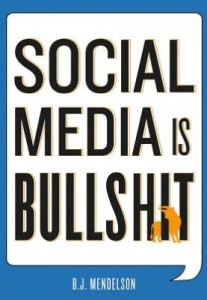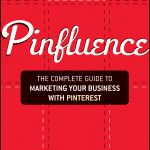Meet Brandon Mendelson (aka BJ Mendelson), an ex-marketer whose recently published book, “Social Media is Bullshit,” has been getting mostly favorable reviews.
(A lot of the flack comes from folks who make a living from social media.) You can listen to the interview in it’s entirety here. Mendelson’s book was actually fun and interesting to read — something you can’t say about a lot of business books — and I’d definitely recommend it.
It’s based on solid research and shows you what’s really happening in the world of social media. And while Brandon could’ve limited his book to just evidence for what’s not working, he took his book even further and outlines for us what does.
Here are the Interview Highlights:
TEA: What’s your opinion on how to market something if social media isn’t the right tool? How do you recommend we as small biz owners build a community online?
BM: There’s a couple of different paths…I worked for an organization called Wounded Warriors Family Support. This organization is run by an ex-Marine Corps colonel and its set up so that when soldiers who’re injured in the line of duty, when they come home, WWFS provides respite. They will take the family on an all-expenses paid trip to Disney World, they help reunite the family and get the veterans acclimated to civilian life. The Colonel hired me to do social media for him, and I told him ‘You know, this stuff really doesn’t work the way it’s advertised.
Which isn’t to say it’s useless. It just doesn’t do what you think it does.’ And he ignored me. He’s not used to being told what to do. And so we went into this Facebook campaign. It was well-targeted to older women (55+) who traditionally donate to WWFS, and we reached about 12,000 on Facebook. And he said, ‘This is great. We’ve got 12,000 fans. How many of them have donated?’ And I looked at him and was almost afraid to tell him, ‘Well, sorry Colonel, nobody. Not a single one.’
And so he asked me, ‘Why do you think that is?’ I explained to him that Facebook in general is great for communicating with friends and family but not very good at requesting transactions or conducting business. And he said, ‘All right. We’ll do it your way now.’
So I came up with this publicity stunt where he would get into a custom-wrapped Shelby Mustang that people could sign, and he would visit a long list of American cities and get out and start high-fiving people. And that was it. The entire concept. We called it “The High-Five Tour.”
And it’s been very successful. It’s going into its 4th year and during the first 3 years, it brought in over a $1,000,000 in donations.  So when people ask me, ‘What works? What’s the alternative?’ I tell them that if you do things right offline, the online stuff will follow. Because if you do something big enough offline, you’ll have people who’ve invested in you. And then you can start taking donations through Facebook, because you’ve already gotten their attention. So that’s the first path.
So when people ask me, ‘What works? What’s the alternative?’ I tell them that if you do things right offline, the online stuff will follow. Because if you do something big enough offline, you’ll have people who’ve invested in you. And then you can start taking donations through Facebook, because you’ve already gotten their attention. So that’s the first path.
The second example is Jake Sasseville. Most people don’t know who Jake is, but he had a syndicated late night television show in over 40 million homes via an ABC affiliate. He had another one that wasn’t quite as successful, and most recently he had a contract with ABC Family where they wanted him to produce 12 episodes and it was going to be in over a 100,000,000 homes. At the last minute they turned around and told him they were cancelling his contract.
He was immediately left with 12 fully produced programs that didn’t have a home. So he looked at what he had, consulted his support system, and he decided to take his show and put it on blip.tv – which is a social media site similar to YouTube or Vimeo. The show is doing pretty well. And the reason why is because he had a plan.
A lot of the social media campaigns and strategies are based on optimism. You hear things like, ‘If you go on Facebook and do X, these things will happen. Read it in my book. It’s guaranteed to happen.’ But they never tell you what to do when you fail. These tools are just tools. It all comes down to the plan you have to utilize them. And that means doing the right research, having a positive outlook – because you don’t want to be like me and be a total cynic, and having the right support group behind you so you can bounce ideas off folks and ask questions like, ‘Is Facebook even right for me?’ You want to have that conversation before you even get there.
So between the two things – being a big spectacle and getting attention for what you’re doing offline first, and having a solid plan in place that’s based on real research – those are the things that will make you successful.
TEA: What about folks who live out in the middle of nowhere? For people who can’t really make a spectacle of themselves offline because there’s not enough critical mass where they live, or they’re house bound and can’t get out. What do you recommend for them?
BM: How remote are we talking? Because I had this idea for a movie called, ‘Old Man On Campus.’ The concept was that my generation — 29/30-year olds — are going back to college and living on campus with the 18 year olds. I thought it would be really funny to experience and write about. So I did that myself this past semester. I went and lived in the dorms at SUNY Potsdam. Potsdam, New York is in the middle of nowhere. You have to drive 3 hours just to get your hair cut. Like if I need to go and encounter civilization, my choices are to take a boat over to Burlington or cross the Canadian border and go up to Ottawa. So I’m pretty remote.
And what works well (and I talk about this in my book)…of all the social media platforms, the only one that really works for networking, is Twitter. I recommend that people who are isolated need to make the best of what they have in front of them. I was able to get media coverage in every single local and regional publication in and around Potsdam.
Look around you. I can almost guarantee you that no matter how remote you are, someone nearby has a blog. I’ve found that to be true. And you want to be friends with them. And once you’ve exhausted those options, you can go onto Twitter and do some networking.
I don’t think it’s the place where you can reach thousands and thousands of people – I think that promise is overblown. But you can go on there and make a few really good connections and get to know people individually.
I’ll give you an example. I was in Portland a few weeks ago and I’m a big fan of The Simpsons. And because I’m a humor writer, I pay attention to who and where other humor writers live and work. I knew that Bill Oakley lived in Portland, so I reached out to him on Twitter. I said, “Hey. My dream is to write for television and I’d love to know what I need to be doing.” And he was kind enough to meet me for lunch and give me some good advice. So if you’re looking for people who can be part of your support team, or for a mentor or advisor, Twitter is great. First you need to know who they are. You need to identify them. Then do a little research and learn as much as you can about them. And when you’re ready, reach out and say hello.
TEA: Yes, that works! I’ve done a lot of that myself. I’m finding that Twitter isn’t nearly as crowded Facebook, so there’s less noise and you’re able to connect with people easier. Also, when you hear people tell you that you’ve got to be on Facebook because that’s where everyone is, remember that big watering holes can work against you, too.
BM: Yep. And you know what bothers me — there was a guy I met at a conference who came unhinged. He and I were on stage together in Vegas (you can read about him if you go to my website and visit the FAQs page). He said if you’re a small shop and you’re on Facebook, you have access to 500,000,000 customers. And he said that with a straight face. I said to him, ‘You know 8 out of 10 Facebook users aren’t even in America. So you’re telling me that someone in Kuala Lumpur is gonna see this guy in New Jersey’s Facebook page and then come to the US to get his teeth cleaned?’ It’s absolutely insane. And the thing about Twitter is that it doesn’t have that friction. It doesn’t have the noise that FB has. But what bothers me is that this guy and other social media experts like him don’t hesitate to trot out examples and say ‘Facebook is proven to drive sales.’
Let’s talk about musicians for a minute. I just saw this post on ReadWrite.com where they talked about social media driving sales. But it’s very misleading. Because if you look close enough you’ll see that the fans they have on Facebook are people who’ve seen the bands perform live. So the people who are already buying the merchandise, are buying on Facebook. And to say that Facebook is driving the sales is not the story at all. It’s really just a sign that people who are already interested in the band, are pursuing them. The point is that we’re all taking the easy narrative of ‘If you do X, this will happen.’ And we’re not looking at what happens in the margins. The reality isn’t what you’re hearing, it’s what’s going on just below the surface.
A great example of how this happens sometimes is the Oldspice campaign. Remember that?
TEA: Of course. I thought it was brilliant.
BM: Oldspice is often sited as an example of a direct response video campaign that drove sales. But that’s not entirely true. That same month they did a coupon campaign – a buy one get one coupon — during that same span of time. And that coupon was is what actually drove a lot of sales.
TEA: So what kinds of questions should we be asking to expose the potential BS?
BM: You can spot a fraud very quickly when they come unhinged. The guy I mentioned before, he has a case study where he tells people he’s got a NY Times best-seller because of Facebook. Because of social media. And he stood on stage and said, ‘I’m 100% transparent and authentic.’ (Which is what they all say.) And because I was told specifically not to mention that he bulk purchased his book (something that a lot of marketers do to get their book on the NY Times list) I just alluded to the fact that marketing authors do that. And the next thing that happened was this guy outed himself. It was all downhill from there. This was in front of 1000 people – all from major corporations – and the first question that was asked by the audience was, ‘Do you think you would’ve become a NY Times bestseller if you hadn’t bulk purchased your book?’
He came totally unhinged and went on a Twitter meltdown the next day. You can spot the frauds very quickly. Do some research on them. Look for their testimonials. Contact those folks and say, ‘Look I’m thinking about hiring so-and-so. How were they to work with? Did they drive results for you? Do you think there was anything else that could’ve happened to help drive those results?’ You want to ask a lot questions about the person, their track record, about previous clients. And then, depending on your business, you’ve got to tailor your questions.
For instance, if you’re a dentist in rural New Jersey, do you even need to be on Facebook? Ask the person if they can show you the numbers of people in your area that are on Facebook. And that’s the thing. You’ve got to take your specific circumstances and tailor your questions to them. It’s funny because you’ll hear things like, ‘There are millions of people on Facebook, and you’ve got to use it to build engagement and trust and on and on.’ The people who are good at what they do will be able to tell you, ‘Here’s a campaign I did. Here’s how much money we raised. Or, here’s how we impacted sales.’ And they’ll be able to give you contact info for people who can verify all of that. It’s when you talk to people who don’t have those answers, or who start spouting buzzwords, or who become a bully – a lot of people will say ‘You have to do this.’ Those are clues.
TEA: Yes. The bullies. Being a bully is a BIG red flag. When you hear, ‘You must, should or have to—anything.’ That’s bullying. And using buzzwords and overused language like ‘You’re going to be leaving money on the table,’ or ‘we’re going to get you to 6 figures with this campaign,’ it’s a clear indication to run in the other direction. But I have another question from a reader. They want to know about forums. Forums have been around forever, so how do you feel about using them for marketing? Are they BS as well?
BM: Not at all. It’s funny. I’m a big forum guy. That was my first experience on the web. I was at this conference in Portland and one of the things that came up was that forums and message boards drive an incredible amount of not just traffic but conversions as well. Forums have been around since 1995 and people know what they are and how to interact with them. They’re a great resource. The thing I try to warn people about (and I talk about this more in my book) is the 1% rule. It’s extremely true that you can interact with people online. But you have to be careful that what’s being said doesn’t define reality. The 1% rule – as determined by the AT&T laboratory — says that only 1% of any online community will do the bulk of the participating. And then 9% might chime in occasionally if something big’s going on. The remaining 90% just sit there and watch. Just be careful in using any of these tools that you don’t take what the 1% are saying and doing as the whole of reality. Your customers are going to be a lot more diverse.
TEA: Right. What we see represents only a tiny portion of our audience. Then do we focus on building a bigger audience? If you can only interact with 1%, then do you need to build your overall numbers?
BM: If that 1% is really loyal and buying regularly, then you’ll be fine. But if not, then you don’t have the luxury of resting on your laurels. It’s kind of like the long tail – usually the folks who respond to long tail searches won’t be enough to support your entire business. Occasionally, you might find a long tail that works, but that’s often not the case.
TEA: Right, and I think what you’ve been saying over and over here is that there are a lot of gray areas when it comes to what works and what doesn’t. Marketing tools and strategies aren’t simply black and white. Your success is going to depend on too many things. (You know every time you ask a marketer a question about how to do something or if you should do something, if they don’t start off by saying, “It depends,” then I know they’re full of shit.) You wrote this book before Facebook started doing the promoted posts, right?
BM: Right. It’s been in the works for almost 3 years. But it holds up pretty well. The content is still very relevant.
TEA: So what do you think about promoted posts?
BM: Here’s what I would tell you. There’s something going on with Facebook. I’ve had a LOT of people telling me – and by a lot I mean everybody from Fortune 500 execs to small biz owners – that they’re reporting suspicious clicks. Coming from the Middle East especially. So I’m a little – again, I don’t want to say that nothing works – but I’m really hesitant to tell people to spend money on Facebook. Because one – any status update only lives for about 11 minutes. Is that really worth the money? In most cases the answer is no. And a sponsored post doesn’t guarantee that everyone’s going to see it; it just gives it a higher likelihood. And two — I can’t tell you who told me this, or what company they work for that may or may not be heavily related to what we’re talking about here – wink, wink, nudge, nudge – but even they don’t know. And if they don’t know, and the people around them don’t know. Well, to spend money on it, I just cringe.
TEA: You’re right about the weird stuff. I recently read an article about this big company that purchased two other companies and then merged all three of the Facebook pages together. But they never gave their customers a heads up. And people started seeing these posts in their news stream from a company that they’d never liked. I saw it happening to me, too. And I don’t remember ever liking ANY of the three companies. So there was a bit of a brouhaha, but I never heard whether it was Facebook’s fault or simply just a customer service fail. As a marketer, we see new tools every day. And putting all our eggs in one tool basket is dangerous. But we can’t dilute our focus too much because that’s ineffective, too. And then you’ve got traditional PR changing and print media going away. What do you recommend we do?
BM: I don’t really believe that print’s going away. It really bothers me how quickly people discount print and magazines because it’s not really true. What’s happening (and I talk about this in the book), the big corporations in America went and bought up all the media outlets in the 90s. And because they have shareholders, they said, ‘We’ve got to make cuts.’ And so the cuts that you see aren’t necessarily because of the Internet. They’re happening because of greed.
This whole myth that the Internet is disrupting print isn’t really true. And if you look, there’ve been 3 major financial crises since the 90s. Corporations came in and bought up all the media outlets which caused advertising revenue to go out the window. So we’re presented with this very narrow focus, and in that narrow focus a lot gets lost. Readership isn’t necessarily shrinking. Resources in general are shrinking. People are still very much reading. Print still drives traffic and sales.
The other issue is that we have this thing in America where if it’s not sexy, we don’t talk about it. Look at Foursquare. It’s not sexy anymore, so it doesn’t get talked about like it used to. But of all the social media platforms, it’s probably one of the few that has some real statistics to show that it drives revenue. It seems to be – this is my current working theory – when a new platform launches, they seem to be really effective at doing stuff. And whether that’s because the media is paying so much attention to them or whether they’re sexy or what, I couldn’t say. But if you look at Pinterest, and Facebook – when they first started, there are lots of stories about those platforms really working and driving revenue.
At least through the first year there’s not as much noise, which may be one reason they work. It doesn’t hurt to be curious and look and see. Don’t jump head first into something because a social media expert told you to, but stay curious.
Success really comes down to being prepared, having a support network, and doing something big. PR has been the same since 1927. You do something big and you hope people show up. Sometimes they do and sometimes they don’t. You can’t control it. The point is to make the effort.
TEA: Speaking of alternatives, what’s your experience with Google+?
BM: It hasn’t really taken off. It was a social network born out of fear. Google was afraid that Facebook was going to become a search engine which is why they created it. I think it’s got a beautiful mobile app, and I’ve been a Google fan for a long time, but I think whenever you force something on someone, they resent it and stay away. The only person who I know of who ever made money using Google+ is Chris Brogan. And he did that by teaching people how to use Google+ before it even launched.
TEA: Guy Kawasaki wrote a book about Google+, too.
BM: I have two things about Guy that drive me crazy. One is that he bulk buys his books. Granted, his publisher requires it, but when you’re a business author, there is definitely a divide between authors who can afford to pay for reviews and bulk buy books and authors like me. When Twitter was big in ’09 and ’10 he was at all these conferences talking about how you have to be authentic and do your own tweets. And he was caught using 3 different ghost writers. If you’re going to make a career out of telling people to be authentic and you don’t do it yourself, well…that really bugs me.
TEA: Did you have anything else you wanted to share with our audience?
BM: I’m very concerned about how social media is being advertised to small biz folks and nonprofits. I was speaking in Burlington and this woman came up to me and said, “Thank you. I’m a small biz owner and I’ve spent all this money on social media and it hasn’t worked. But I haven’t said anything.’ She was suffering quietly and I think a lot of small biz owners are doing that. If you can take anything away from this, it’s this: don’t suffer quietly. Say something if Facebook isn’t working for you. That’s how we’re going to get people and companies to be accountable. If you have stories where you’ve done things on social media and it hasn’t worked, share that. Because it might not be you. There are a lot of variables to consider.
***
So – what about you? Do you have a social media story to tell? Question to ask? Let’s discuss it in the comments below.











Really insightful interview Tea, thank you and Brandon. Particularly around the view that leveraging online from offline activity can work so well. It was great to get a shout out for forums too. They are valuable too for the fact that they keep a record of the meaty conversations which otherwise disappear into wherever they go in Facebook.Love anything that exposes the BS artists. They are harmful and should be outed.I believe one person who really advocates for what you do is a better benchmark than the burned time spent in collecting hundreds of people who will likely never interact. Although, that might mean you pay a price in visibility.
You’re welcome, Kimberly. And thanks for sharing your voice!
You’re welcome, Annie. I’ve got to say that Brandon’s book is an important read — even if it’s just to get the message to ask more questions.
Exactly! (No magic bullets either.) Thanks for stopping by, Deborah!
Thanks for sharing this honest assessment of social media. I’ve always experienced Facebook as a place to connect with folks you already know or have met in person or in online programs, than a place to attract clients. I agree that doing something big offline is far more effective in getting quality contacts online than counting on online alone. Even if the offline campaign is just speaking to local groups is lots more beneficial than just online. I wonder what his take is on LinkedIn? I’ve found folks there to be more dedicated to building their businesses and willing to refer and introduce potential clients and contacts.
What I like about this interview is the useful information. How to separate the wheat from the chatter. With all this buzz and baying about “just do this,” finally there is some advice that says, “Research whether they have successful clients, if their clients make actually money from their help. Numbers mean nothing if they don’t produce results. That is amazing: 12,000 facebook fans and not a single donor? Shows the disconnect for sure.
Wow … someone who is honest about social media! so refreshing! Seriously, I have my own “issues” with fb and this just validates my feelings. I don’t hide my feelings but I don’t talk about it enough. This interview has really inspired me to be more open about it. Thanks, Tea, for sharing this great and insightful interview! And I cannot wait to get my PRINT copy of Brandon’s book 😀
Thoughtful interview – thanks for doing this, Tea. I’ve been skeptical of both sides of the argument, to be honest – not sure where I stand yet, but maybe that’s the ultimate point: No one can be sure yet, given the mercurial nature of social media and its relative newness. I do agree there are serious issues with the way it’s being pushed on small biz owners and solos, without reservation.
Great interview, T. I had never heard of this guy, but I am totally on board. Social media offers us all a set of tools, there’s no magic wand.